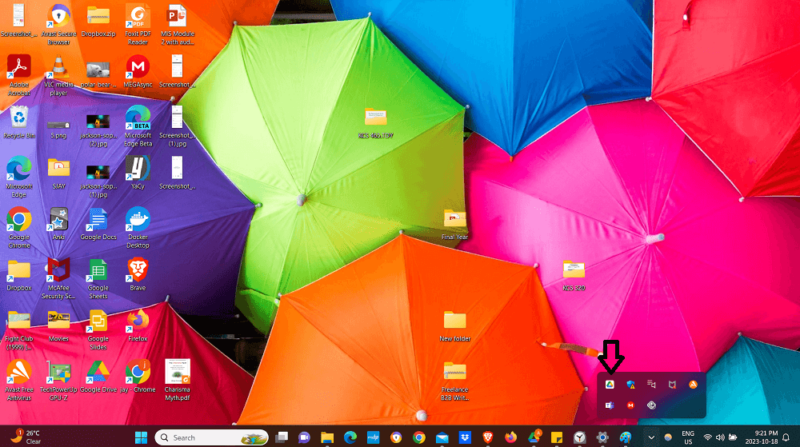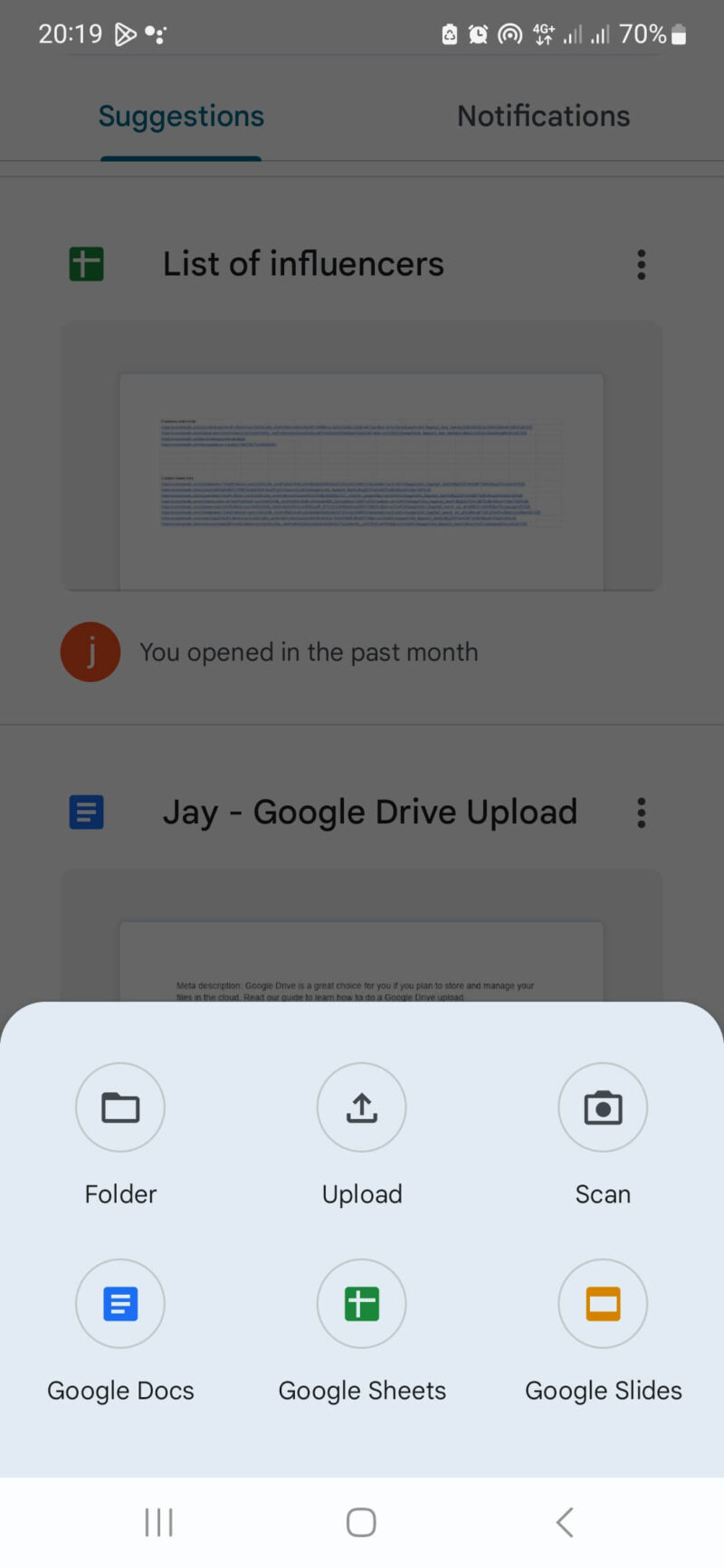How to Upload to Google Drive in 2025: Videos, Photos and Other Files
If you want to save space on your device, our guide will show you how to upload to Google Drive and manage your files more efficiently.
Key Takeaways: Google Drive Upload — Files, Folders & Videos
- The easiest way to upload a file or folder to Google Drive is through the website. You just need to open the website, click the “new” button and select the file type you want to upload.
- To upload a video to the Google Drive Android or iOS app, open the app and click the “+” button at the bottom-right corner of the screen. Select “upload”, “videos” and select the video in your device you want to upload to Drive.
- When you sync photo and video folders to the Drive mobile app, the syncing takes place in Google Photos.
- When you upload a Microsoft Office file to Google Drive, you can edit it and convert it to its corresponding Google file type.
If your device is running out of storage space, you can free up large amounts of data by uploading it to Google Drive. Cloud storage services, such as Google Drive, make it possible to store, organize and access files from any connected device. In this guide, we will walk you through the step-by-step process of how to upload to Google Drive.
There are three ways to upload files to Google Drive: the website, the desktop app and the mobile app (read our “what is Google Drive” guide for more details on how to use Google Drive). Google Drive also allows you to convert uploaded files to Google file types. You can also edit these files within Google docs. We will take you through this process as well.
-
11/20/2023 Facts checked
We’ve rewritten and updated this article to make sure it’s current to the latest versions of Google Drive.
How to Upload to Google Drive With a Browser: The Easy Way
The Google Drive website has a simple user interface, making it possible to upload files with just a few clicks (read our Google Drive review to learn more about Google Drive’s user-friendly platforms). Follow these steps to upload files to Google Drive through your browser.
- Visit the Google Drive Website
Visit drive.google.com, sign in to your account and click the profile icon at the top-right corner of the screen. Navigate to the folder where you want to upload the files, either your own or a folder owned by someone else. Then, click “new” at the top-left corner of the screen.
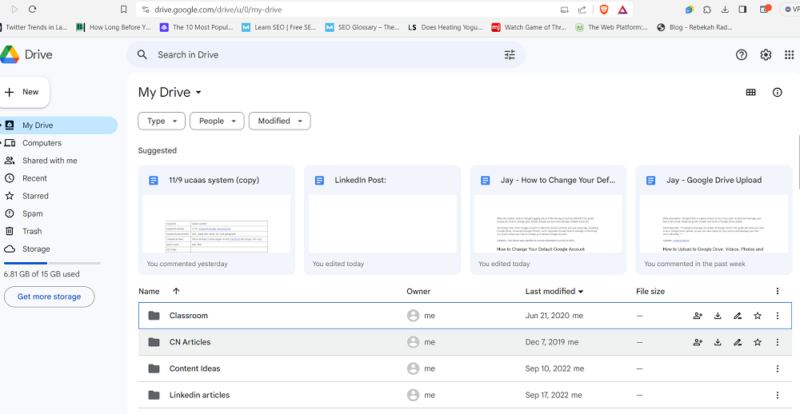
- Select “File Upload” or “Folder Upload”
Clicking “new” will open a menu containing different options. Select “file upload” or “folder upload,” depending on what you want to add to Google Drive.
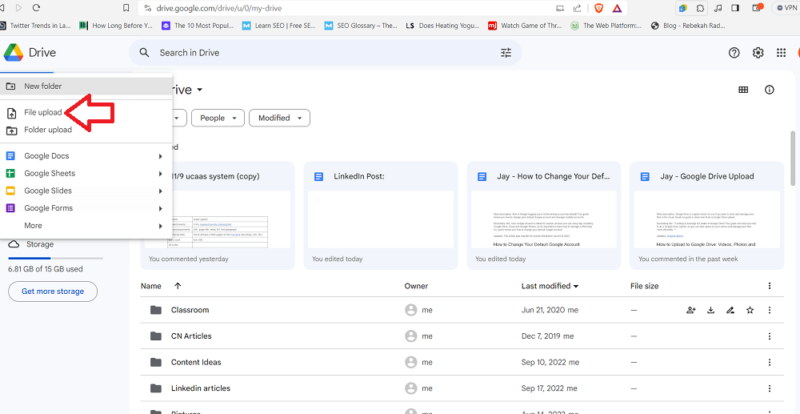
- Locate, Choose and Add the Files You Want to Upload
To add a file or folder from File Explorer, double-click on it. To upload multiple files or folders, click on one of the files you want to upload and hold down the control key (Ctrl) on Windows or command key on Mac. With your finger still on the control key, click on the other files or folders you want to add to Google Drive. Once you’ve selected all the files you want, double click on the selection to upload them to Drive.
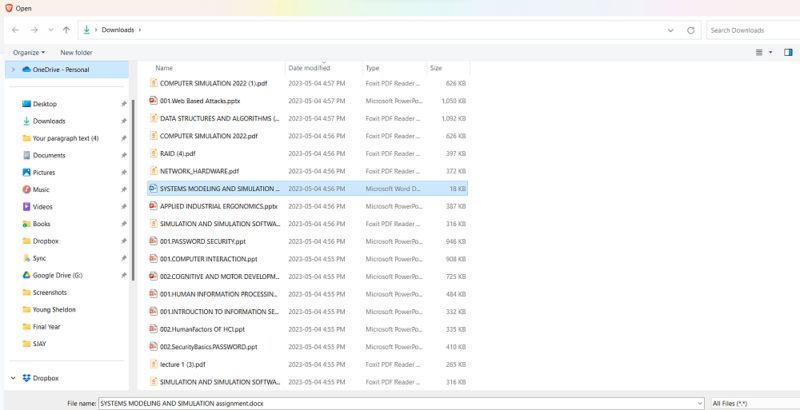
How to Upload Files to Google Drive on Desktop
Google Drive has identical user interfaces for the desktop app and the website, so you can follow the steps in the previous section to upload files or folders with the desktop app. Using the desktop app is convenient if you don’t want to open your browser every time you sync files to Google Drive.
10,000+ Trust Our Free Cloud Storage Tips. Join Today!

- Demystify cloud storage terminology and key concepts in plain language
- Discover easy-to-implement techniques to securely backup and sync your data across devices
- Learn money-saving strategies to optimize your cloud storage costs and usage
Automatically Upload Folders to the Google Drive Desktop App
Google Drive’s desktop app is also the only way to set up automatic syncing. Automatic syncing facilitates data recovery by ensuring your Drive folder is always up to date. When you sync a folder to the Google Drive desktop app, any changes (file edits or removals) you make to that folder will automatically sync to the separate file on Google Drive.
We’ll show you how to upload to a folder on Google Drive from Windows, but the steps are almost identical on Mac.
- Click the Gear Icon
A small window will pop up on the screen. Click the gear icon at the top-right corner of the pane. From the menu that appears on the screen, select “preferences.”
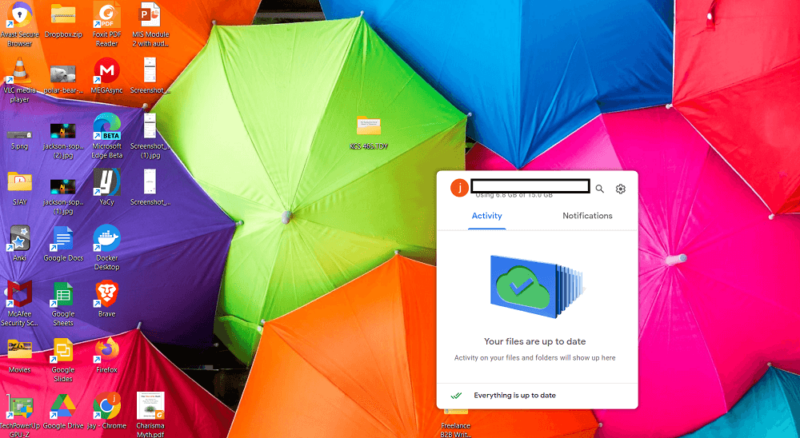
- Click “My Laptop”
This will open Google Drive’s preferences tab. Click “add folder.” Then select the folder you want to upload to Google Drive. Click “select folder.”
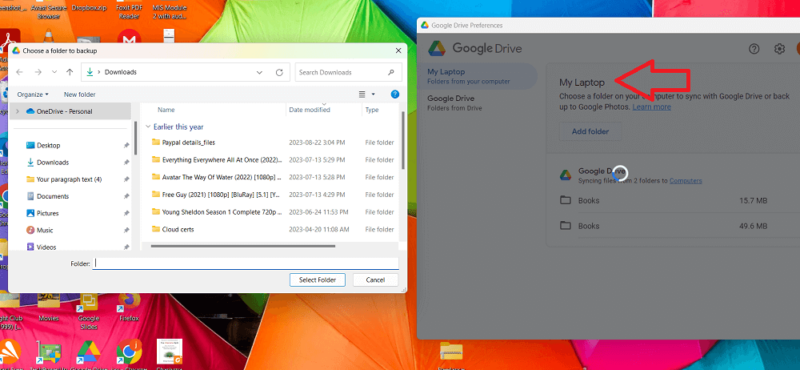
- Choose an Option
You can choose either to sync all the files and folders contained in the folder to Google Drive, or to sync just the photos and videos contained in the folder to Google Photos. Checking both boxes means that your photos and videos backed up to Photos and Drive will be uploaded twice, taking up more storage space. After you’ve chosen your option, click “done.”
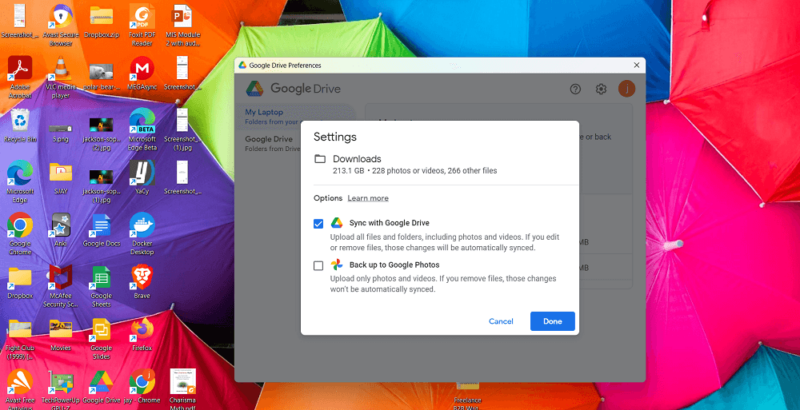
- Click “Save”
Click “save,” and the upload will begin immediately. Remember that once you’ve done this, the folder will automatically make changes in the cloud whenever you make them in the folder on your device.
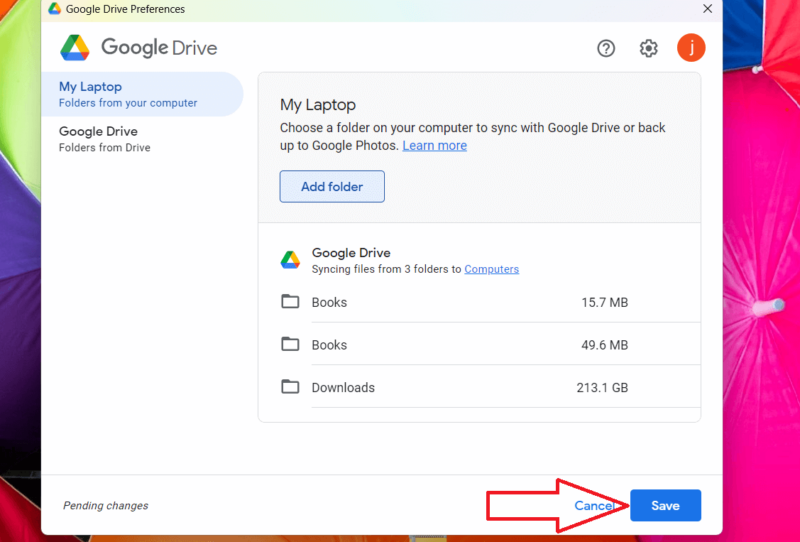
How to Upload a Video to Google Drive: Mobile Version
The steps for uploading files to Google Drive on mobile are virtually the same for Android and iOS. In this guide, we’ll use an Android device to show you how to do the upload.
Before you begin, you’ll need to download the Google Drive app from the Google Play Store or Apple App’s Store — although Drive comes pre-installed on most Android devices. Once you’ve installed the app on your smartphone, sign in to your account.
- Click the Plus Icon in the Google Drive App
With the Google Drive app on your Android phone or tablet open, tap on the plus sign at the bottom-right corner of the screen.
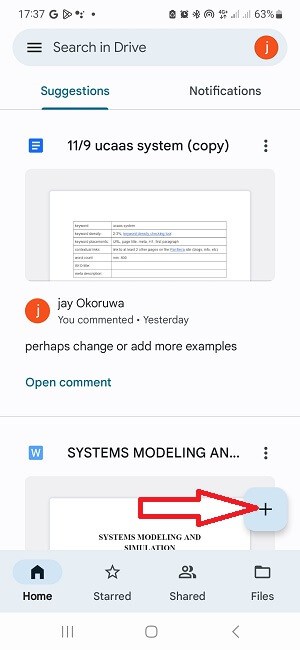
- Click “Videos”
Click “videos” at the top of the screen to open your video list. Tap on the video you want to add to Google Drive, and the upload will begin immediately. To locate the file you want to upload to Google Drive, click the hamburger icon at the top-left corner of the screen and select “recent.” If the upload was successful, the video you just added will be the first file you see.
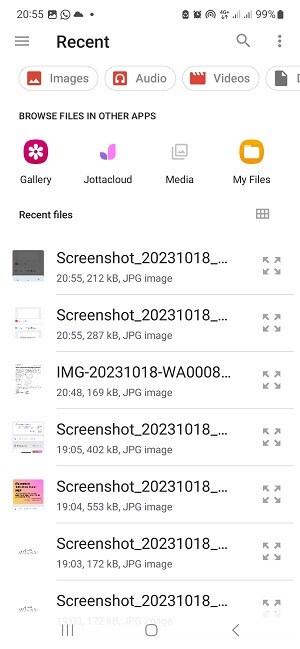
Automatically Upload Videos & Photos Using the Google Drive Mobile App
You can also automatically sync photo and video folders to the Google Drive mobile app. However, the syncing takes place via Google Photos, not Drive.
- Click the Hamburger Icon
Open the Drive mobile app on your device, and tap on the hamburger icon at the top-left corner of the screen.
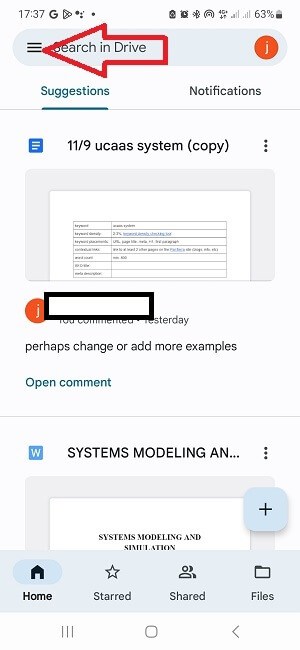
- Go to Settings
Select “settings” from the side-bar menu that appears.
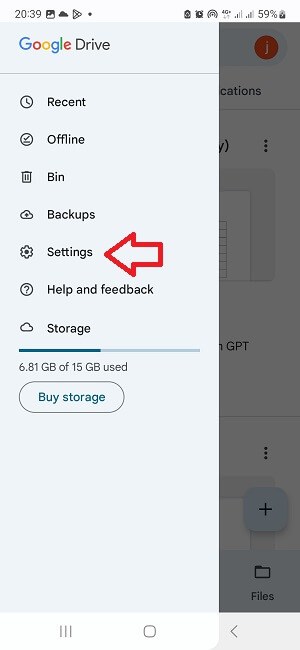
- Click in “Backup and Reset”
On the “settings” page, click on “backup and reset.”
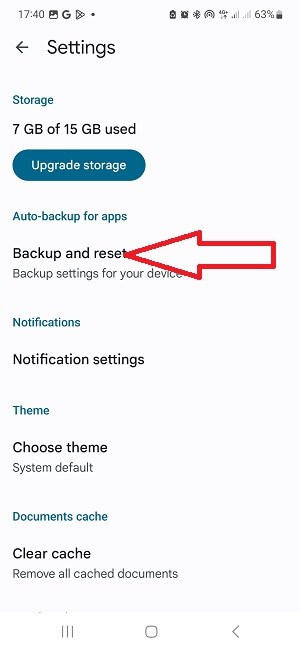
- Click “Photos and Videos”
Scroll down and click “photos and videos.” This will transfer you to the Google Photos app.
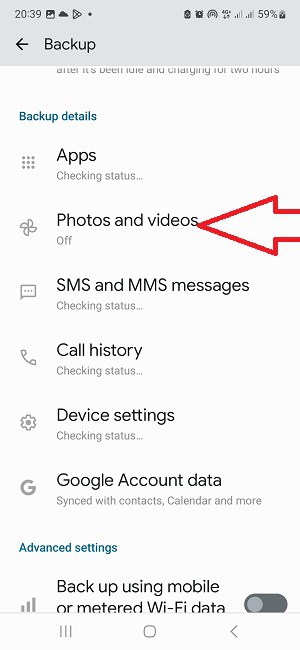
- Toggle On “Backup”
Toggle on “backup” to make photos and videos automatically backup to Google Drive.
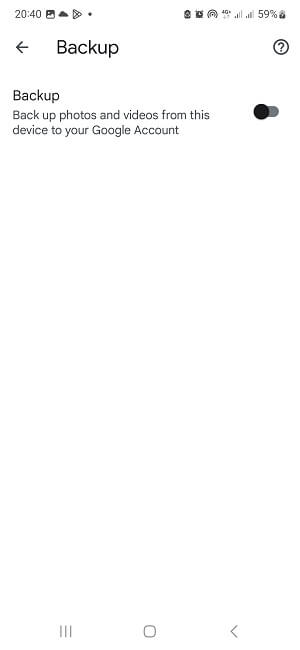
How to Convert and Edit Files With Google Drive
Google Drive has a versatile set of tools that can do much more than just file uploads. Any Microsoft Office file you upload to Drive opens in its corresponding Google Workspace app, and can be saved and converted to the corresponding Google Workspace format.
For example, when you upload a Microsoft Word document to Drive, you can open it in Google Docs, edit it, save it and convert it to a Google Docs document. Follow these steps to do this.
- Go to the Google Drive Website
Visit “drive.google.com” in your preferred browser. Once the webpage opens, click the “new” plus sign icon at the top-left corner.
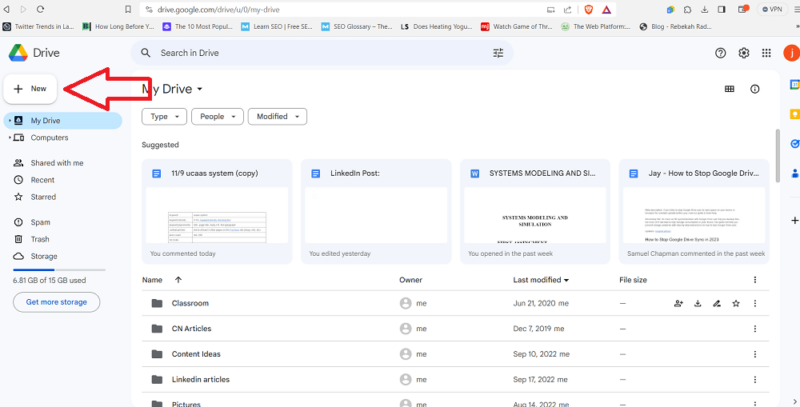
- Click “File Upload”
Select “file upload” from the list of options.
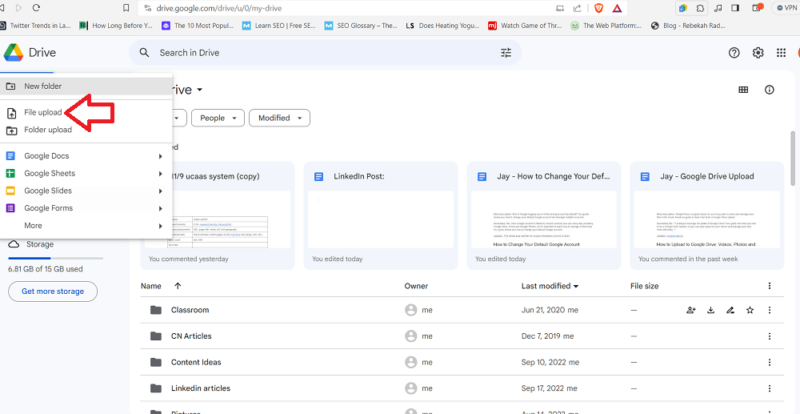
- Locate Your File in Windows File Explorer
The File Explorer window will open. Locate and double-click on the Microsoft Office file you want to upload.
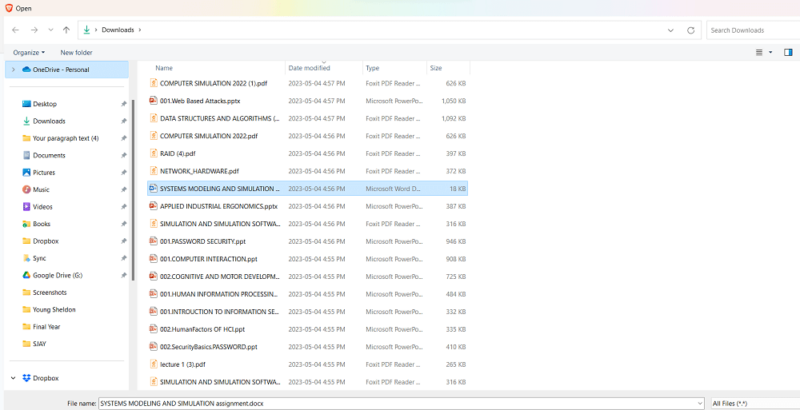
- Open the File in its Corresponding Drive Document
Once the upload is complete, you’ll see it at the bottom-right corner of the screen. Click on it to open in its corresponding Drive document. You can now begin editing it.
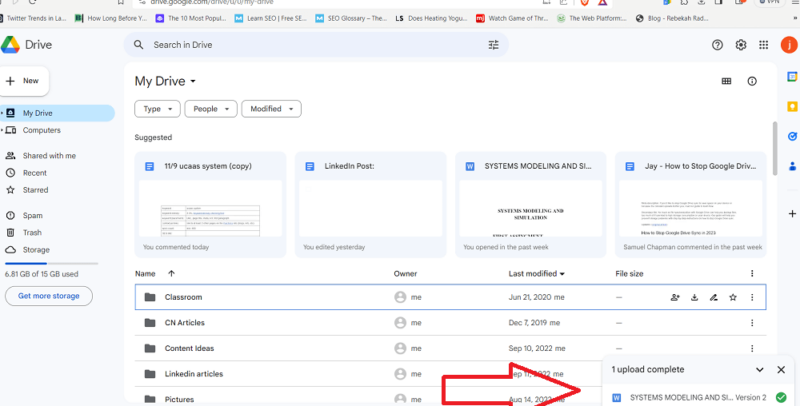
- Click “File” at the Top-Left Corner of the Screen
In the open file, tap on “file” in the menu and select “save as Google Docs, Google Sheets or Google Slides” per your document type. Your file will automatically be saved to Google Drive as the Google workspace format.
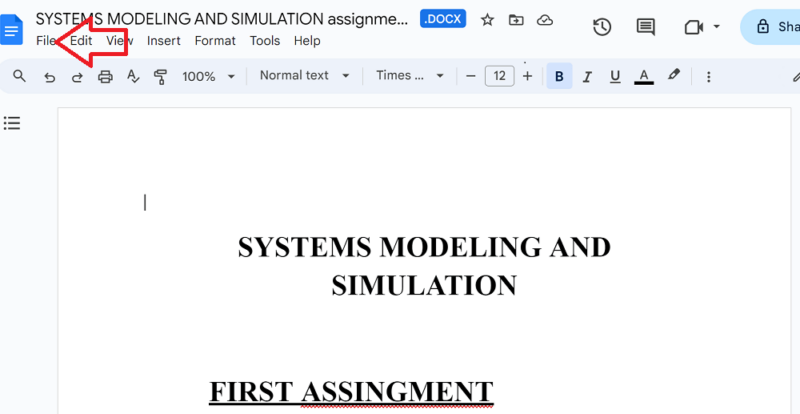
Final Thoughts: Upload Files and Folders to Google Drive
With Google Drive, you’re not just storing files in a repository on the internet; you’re boosting your efficiency through better management and streamlined collaboration. Beyond uploading files, you can share your files with others through Google Drive, sort them into private or shared folders, and backup your data.
If you’re not satisfied with Google Drive, you can check out our guide on some of the best Google Drive alternatives. Sync.com and pCloud are two of our favorites thanks to their security and large feature set. Our Sync.com vs pCloud comparison gives you a comprehensive breakdown of what to expect from security-first cloud storage.
For related guides, refer to our article on how to transfer ownership on Google Drive folder.
Have you ever used Google Drive to upload a file? Did the steps in this guide work for you? What other methods do you recommend? Let us know in the comment section below, and as always, thanks for reading.
FAQ: How to Upload to Google Drive
Google Drive is a Google-owned cloud storage and file synchronization service that can store, share and edit files.
You can upload files to Google Drive through the website or via the Drive for desktop app.
Simply navigate to the shared drive and follow the upload procedure.
Make sure you have the Google Drive app installed on your phone. Open it, tap on the “+” button and select the files to upload them to Drive.



